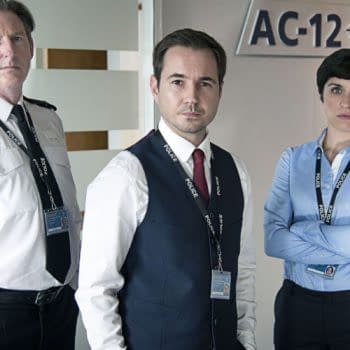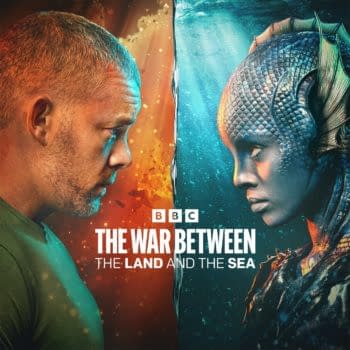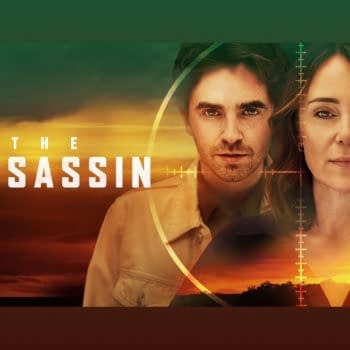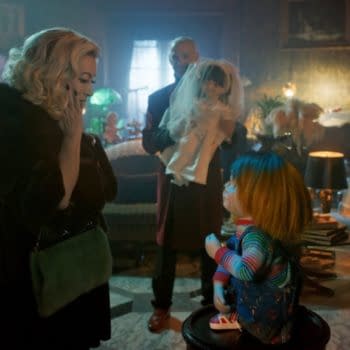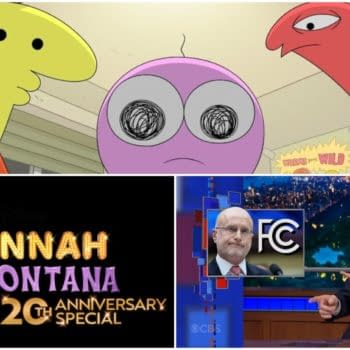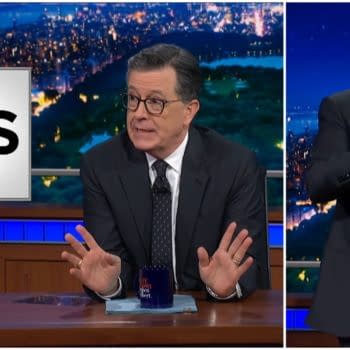Posted in: CBS, TV | Tagged: Ava Duvenay, bleeding cool, blue bloods, cable, cbs, david e kelley, FBI: Most Wanted, hill street blues, Homicide: Live on the Street, James Patterson, Law & Order, law & order true crime: the menendez murders, law & order: criminal intent, nypd blue, rene balcer, Selma, streaming, television, the shield, The Wire, tv
FBI: Most Wanted Showrunner Rene Balcer on Cop Shows, COVID-19 & More
Rene Balcer is the creator and showrunner of CBS' FBI: Most Wanted. He is one of the most seasoned showrunners in the TV industry, having written for shows as diverse as Star Trek: The Next Generation and then becoming the showrunner for the original Law & Order and created and ran its second spinoff Law & Order: Criminal Intent. He has won multiple awards for his television work and most recently, he created and produced the miniseries Law & Order True Crime: The Menendez Murders. He created the FBI spinoff FBI: Most Wanted and the first season was completed right before the pandemic shut down production across the industry and locked down New York.
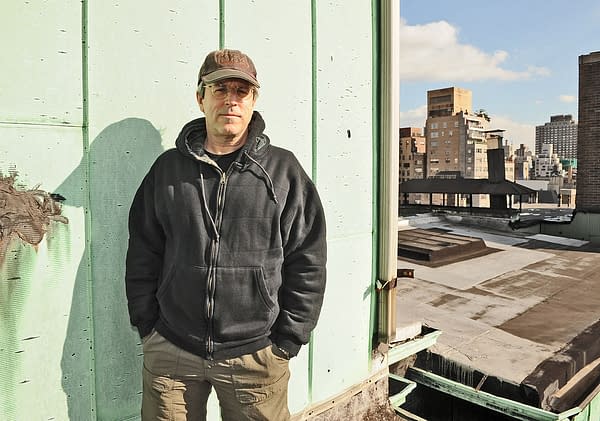
While all film and television production are on hold, producers and writers continue to be busy writing and preparing shows for when things start up again. Rene Balcer was kind enough to offer his perspective on the history of cop shows on American network television, how cop shows might be moving forward in the light of changes demanded by the Black Lives Matter protests after the killing of George Floyd. He also offers a cautionary note about when and how production will resume while the pandemic is still ongoing.
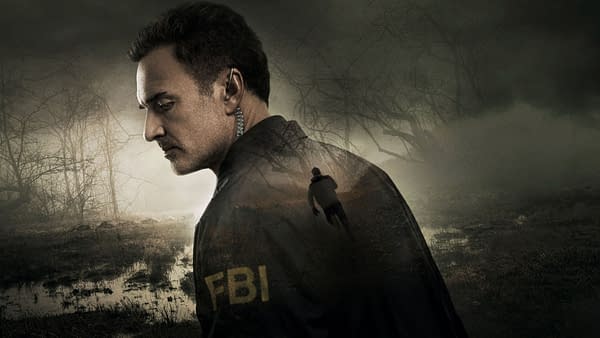
The Showrunner's Duties
First question. This might be basic, but not all people outside the industry know what a showrunner is. Can you tell us what an Executive Producer, or showrunner, actually does on a show?
Showrunner and Executive Producer are not interchangeable titles. Whereas "Executive Producer" can be a catch-all credit, generally speaking, a showrunner (often the head writer) is responsible for the show's creative direction and the day-to-day creative decisions (stories, scripts, casting, directors, locations, post-production). Since television is a collaborative medium, the showrunner will make those decisions in consultation with other creative partners, but the ultimate decision is his or hers.
On Running FBI: Most Wanted
You've created and run the first season of FBI: MOST WANTED. It addressed some progressive issues like LGBTQ representation, army veteran PTSD, racist ICE and white supremacist groups. What was the thinking behind the show beyond the basic premise of the FBI hunting dangerous fugitives?
It was never a lifelong ambition of mine to create a "team procedural" for CBS, but when the opportunity presented itself, my immediate inclination was to try to make something more of it. At the time, I was putting together another series, about missing and murdered indigenous women along the "Highway of Tears" in British Columbia (this series is still moving ahead with Constantin Film). I knew that one of the biggest problems that the First Nations and Native American community faces is invisibility – outside of historical projects, they have zero presence on American mass media. I saw "FBI: Most Wanted" as an opportunity to change that, by presenting a modern Native American family living off the reservation while maintaining and celebrating its cultural identity. So, in creating the lead character of Jess LaCroix, I had him marry into an urban Native American family, work alongside his brother-in-law and raise a daughter with the help of his in-laws. This family is now a regular weekly presence on a show with a viewership of some 12 million people on one of the most powerful media platforms in the country. Not so invisible anymore.
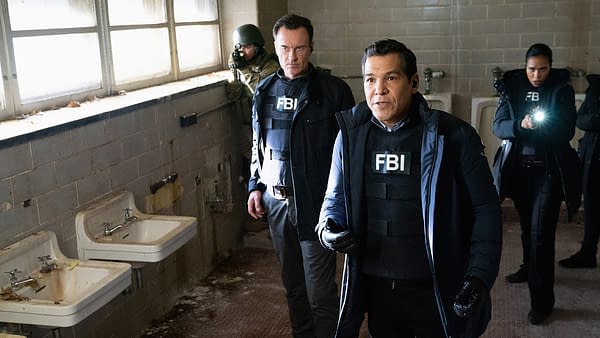
As I created the show, I saw opportunities to populate the regular cast with characters from other underrepresented communities in a naturalistic and authentic way. One of our FBI agents is a gay Black woman raising a child with her wife, another agent is a veteran struggling with PTSS, another agent copes with the ongoing trauma of being victimized by a stalker. All of them are inspired by people I've met in law enforcement. They offer perspectives and entry points into narratives that stretch beyond the usual meat-and-potatoes of fugitive stories.
As for the "progressive" issues addressed in many of our storylines, well, it's hard to do a show about crime that doesn't at some point intersect with social justice issues. Besides, I've never been a darling of the Breitbart/Fox News crowd which has at various times called me a "Marxist provocateur". Screw them. I don't see what's so progressive to think it's inhumane to separate children from their parents and warehouse them in ICE cages. I'd rather be on the right side of history than toady to the Trump-McConnell regime. So yes, the storylines, at least in the first season, have led us to examine such issues as the murders of Indigenous women and the multi-generational trauma from "Indian" residential schools (the episode "Ghosts"), systemic racism in sentencing ("Defender"), cover-ups of police violence ("Ironbound"), veteran PTSS ("Invisible"), among others, as well as various psychological, behavioral and family issues.
This isn't breaking new ground as far as the Dick Wolf shows I've been involved with. Fifteen years before "When They See Us", I did an episode about the police frame-up of the so-called Central Park Five kids on "Law & Order Criminal Intent" (the episode "Monster"). Twenty years ago, I did an episode on "Law & Order" about the murder of a Black motorist by four NYPD cops ("DWB"). What's depressing is that the issues those episodes addressed are as current now as they were twenty years ago.
The Upcoming Challenges of Filming During the Pandemic
You ended your first season just as lockdown occurred. How do you think the production is going to resume with precautions and protocols barring a viable vaccine becoming available?
Very gingerly. Pre-production on "FBIMW" was ambitiously scheduled to resume on August 3. That date has now been pushed back another month, at least (of course, there's nothing wrong with setting a target date, we all work better with some kind of deadline). And now today, as I write this, Google has told its employees to expect to work from home until June 2021 – and the MLB has again suspended play because of positive COVID tests among the Miami Marlins. It would be prohibitively expensive (and crazy-making) for TV productions to operate on a stop-and-go basis. Production will resume when all the unions involved are satisfied that their members can work safely, and when the studios are satisfied that their productions can be reasonably insured against the cost of another shutdown. Until then, enjoy the reruns.
A History of the Hollywood Cop Show
On top of lockdown, the killing of George Floyd ignited Black Lives Matter and pushed issues of institutional racism, police accountability, and civil rights to the forefront. What are your thoughts about how cop shows will move forward when audiences and the general public are demanding more authentic and accurate storytelling in the genre?
First, a little history. For the first seventy years of American mass entertainment, cops were portrayed either as boobs (the Keystone Kops) or as corrupt violent thugs (just about every film noir I can think of). The real hero was the noble and cynical private eye (from Philip Marlowe to Jim Rockford), or the idealistic defense attorney ("The Defenders") who protected the dispossessed and the underdog against the entrenched powers.
In the early days of television, Jack Webb sold his soul (and television's, assuming it had a soul) to the LAPD in order to produce "Dragnet". At the time, the LAPD was a bunch of violent and corrupt boobs ruled by Chief William Parker who insisted that every new LAPD recruit join the ultra-right-wing John Birch Society. Chief Parker saw in "Dragnet" an opportunity to put lipstick on the pig that was his LAPD – and Jack Webb became an obliging apologist for the LAPD's transgressions. Though "Dragnet" was a success, the rest of television continued to see cops as tools of the ruling class. "Dragnet" and Webb's other creation "Adam-12" eventually devolved into absurdist Nixonian law-and-order diatribes…and then came Joseph Wambaugh who portrayed cops as flawed but ultimately heroic working-class joes just trying to hold back the criminal tide of the 1970s. The thin blue line. This gave birth to "Police Story" and "Cagney and Lacy"… and later "Hill Street Blues" and even such fantasies as "Miami Vice". Though the anti-heroic private-eye knight hobbled along with "Magnum PI", his days were numbered.
As went the portrayal of police officers, so went the portrayal of lawyers. The crusading defense attorney of the 50s, 60s, and 70s gave way to the glamorous prosecutor Joyce Davenport of "Hill Street Blues" in the 1980s. In the face of a rising crack-fueled tidal wave of crime in the 1980s, the TV audience gravitated to these new heroes ostensibly fighting the good fight. Never mind that the so-called "crack epidemic" was a political concoction that exploited racial stereotypes and hid the inherent inequities between draconian arrests/prosecutions of crack offenders (almost exclusively targeting poor communities of color) versus slap-on-the-wrist arrests/prosecutions of powdered cocaine offenses (the drug of choice of moneyed whites).
By the 1990s, the tide had completely turned, procedurals became the almost-exclusive province of cops and prosecutors – "Law & Order", "NYPD Blue", "Homicide", etc. Only David Kelley seemed to be still fighting the good fight with "The Practice".
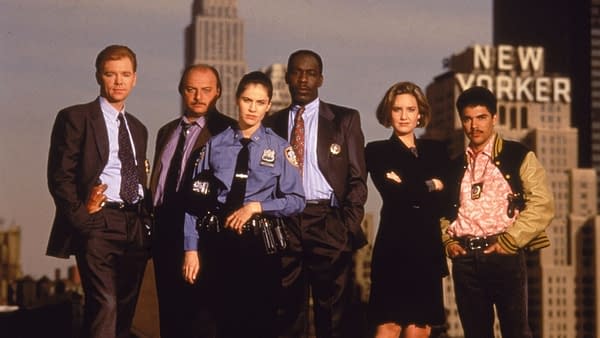
The cops in these procedurals generally fell into three categories – well-meaning but overworked detectives trying to do their job the right way and occasionally coming up short (i.e. "Law & Order" – the mothership – though our detectives rarely fudged evidence or manhandled a suspect, and when they did, they – and the case – suffered for it); or well-meaning but deeply-flawed cops who transgress the rules to catch the bad guys ("NYPD Blue" – but to be fair, Sipowitz's brutality, racism, and drinking got him into a lot of trouble, and he did eventually reform); or in the third category, corrupt cops who gladly brutalize and frame guilty suspects before ripping them off ("The Shield" – though Mac's corruption is excused because, gee, the poor guy has two autistic kids to support, as if the actual corrupt Ramparts cops "The Shield" was based on actually needed any such excuse). In a category of its own is "Blue Bloods", which glorifies a cop who proudly violates the rights of suspects to get a conviction while his police commissioner dad winkingly looks the other way, taking an ends-justifies-means approach to law enforcement.
Which of the above portrayals is accurate? All of them, in part – yes, there are cops who became cops because they wanted to serve the community; yes there are good cops whose flaws lead them astray; yes, there are cops who are beaten down by the job until they just take what they can grab. But all of these shows are fantasies as well, crafted to appeal to an audience.
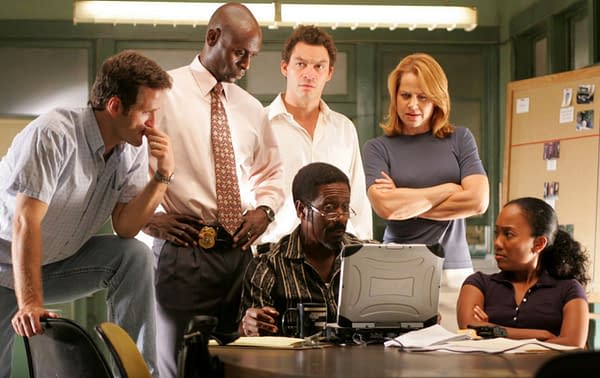
"The Wire" is acclaimed as the most authentic of recent cop shows. The cop side of the show doesn't stray too far afield from the other shows I mentioned – the squad is a mix of well-meaning, sometimes flawed, sometimes out of control characters, their personal lives are messy, they're frustrated by the bureaucracy, they're trapped in a game they know they can't win, etc. To me, where the show succeeded is that it gave equal weight to those characters on the perp side and made you feel for them – they too are trapped in a game they can't win. To its credit, "The Wire" dramatized the truth that the System isn't broken, it's actually working exactly as it was designed, to keep poor communities of color down -The cops aren't supposed to win the war on drugs, because winning would free those communities from drugs and poverty.
With all that, for all its authenticity and excellence, are cop shows like "The Wire" what audiences really are demanding? If ratings are the measure, it seems not.
To break out of the format, crime procedurals could attack the subject from fresher perspectives. The ABC series "For Life" is a good example. Just renewed for a second season, one can hope it'll find a larger audience.
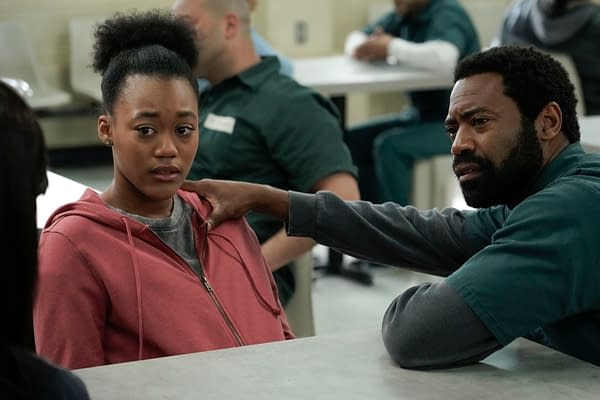
Since conflict is the essence of drama, and the higher the stakes the better, it's hard to resist the world of police work as a setting for a series. And as long as law enforcement types are cast as the heroes of procedurals (and they will continue to be for as long as politicians are able to convince the public that crime and terrorism are the number one threats to our society), it will be difficult to get away from the tropes I mentioned earlier. Maybe the tide will turn again, and TV cops will go back to being boobs and corrupt thugs. Or audiences will grow to accept more modulated portrayals of police officers.
Better yet, maybe society will recalibrate what we expect from our police officers – get them out of policing traffic and schools, don't use them as the first-line response in domestic calls, de-militarize them and take away the Bearcats and assault weapons, don't assign sociopaths like Derek Chauvin as Training Officers to new recruits, etc. One can always hope.
For Justice: The 2015 Pilot That's Even More Relevant Now
You worked on a pilot in 2015 about a division of the FBI that enforces civil rights, which Ava Duvernay directed fresh off Selma's nomination for the Oscar for Best Picture. Can you talk about the script and why it never got picked up by CBS?
The series, entitled "For Justice", focused on a Civil Rights task force made up of FBI agents and Department of Justice lawyers that each week went out in the field to investigate various civil rights violations, from voter suppression to police violence, etc. Think of a contemporary version of "Mississippi Burning." In the pilot, the task force investigated the roadside murder of a Black politician, an investigation that leads them to a small-town police force. I wrote the pilot in 2014 in the wake of Ferguson, and one centerpiece of the show was a Black Lives Matter march that devolves into a police riot. There was a serialized subplot involving the fugitive ex-radical father of the show's lead character, a Black female FBI agent, and a white-supremacist plot to ignite a race war. The show was very loosely based on James Patterson's first novel, "The Thomas Berryman Number".
CBS ordered the pilot, and we approached Ava Duvernay to direct it. I admired Ava's indie film "Middle of Nowhere" and was very happy when she agreed to direct "For Justice" – at that point, Ava had never directed a pilot but her film work held a lot of promise. She was fresh off the success of "Selma" and was busy with festivals, press tours, and collecting well-earned kudos. Our pilot was one of the last that CBS ordered, the window we had to shoot the pilot was extremely narrow. So we got to work in a hurry.
We delivered a very credible proof of concept. The cast of regulars was excellent – Anika Noni Rose in the lead, Tim Blake Nelson, Phylicia Rashad, Mario Van Peebles, and Shawn Hatosy. But CBS passed and didn't order it to series. Maybe the serialized subplot didn't fit the CBS format, or maybe the subject matter was a little too edgy and ahead of its time. Now, it seems searingly relevant. Bottom line, Ava and I did good work, and it would be nice to think that with events having finally caught up with it, "For Justice" could get another bite at the apple.
FBI: Most Wanted is now on CBS.



